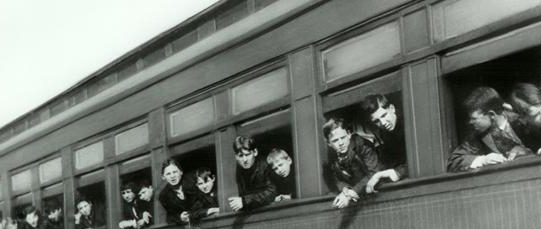 |
| Image Source |
Two days ago, I received a much-awaited email from an archivist with the Children's Aid Society in New York City in regard to a research request I placed at the end of January. Just in case you're wondering, I'm finding genealogy to involve a lot of what I call "fishing" for information. Sent out a baited line (ie: email to a historical society, archive, family member, etc.) and wait for a nibble. Maybe I'll be lucky enough to land a HUGE fish in the form of a break in a brick wall. Other times, I might catch a shoe (like this week). Cast, tug, wait, reel-in, repeat.
So, back to the Children's Aid Society.
Paul's paternal great grandfather, a gentleman named Joseph W. (William?) Daly {1869-1934}, was an orphan train rider. Until a few months ago, when we started to suspect that he was in fact an orphan, I had never even heard of the Orphan Train Movement in the United States. Reaching out to one of Paul's cousins enabled us to gain a clearer picture of Mr. Daly's background - especially from anecdotal evidence gleaned from other relatives, plus a few wonderful clue-laden documents transcribed by his daughter Ruth. Suspicion confirmed! While researching initially and getting more and more frustrated, I told my husband it was "as if he was dropped off in Iowa after spending a few years in New York, his birth place". No birth records existed other than documentation on US Federal Census forms that Joseph's birth place was New York. The main clue that I identified early on was that on all census forms his parents' birth places were listed "unknown". This is the hallmark census notation of an orphan train rider.
On the Orphan Train Movement - some notes from the Children's Aid Society website:
...The children ranged in age from about six to 18 and shared a common grim existence. Homeless or neglected, they lived in New York City's streets and slums with little or no hope of a successful future. Their numbers were large - an estimated 30,000 children were homeless in New York City in the 1850s. Charles Loring Brace, the founder of The Children's Aid Society, believed that there was a way to change the futures of these children. By removing youngsters from the poverty and debauchery of the city streets and placing them in morally upright farm families, he thought they would have a chance of escaping a lifetime of suffering.
He proposed that these children be sent by train to live and work on farms out west. They would be placed in homes for free but they would serve as an extra pair of hands to help with chores around the farm. They wouldn't be indentured. In fact, older children placed by The Children's Aid Society were to be paid for their labors.
The Orphan Train Movement lasted from 1853 to the early 1900s and more than 120,000 children were placed. This ambitious, unusual and controversial social experiment is now recognized as the beginning of the foster care concept in the United States. (SOURCE)
According to his obituary (remember THIS post about genealogical serendipity?), Joseph W. Daly was born in Utica, New York on November 25, 1869 to father John Daly and mother (name unknown). According to family recollection, they were of Irish or Scottish descent, and Joseph was possibly 2nd generation. Mr. Daly's obituary also includes previously unknown facts that his father died shortly before Joseph's birth - and his mother died shortly afterward. I have one US Federal Census record from 1880 in which a Joseph Daly is listed (correct age, as well) living at the St. Vincent's Male Orphan Protectory in Utica, NY. No absolute proof that this is our Joseph.
At some point in the late 1870s or early 1880s, Joseph was relocated from New York via orphan train to Allamakee County, Iowa, where he was adopted (or indentured...still unsure) by the family of Benedict Troendle, a prominent local farmer.
I initially contacted the Children's Aid Society archives in search of any possible record on file for Joseph Daly matching these known facts. Sadly, the letter this week failed to show that his adoption was managed by C.A.S. All is not lost, though! A few key facts in this case: 1) he was orphaned as an infant, according to his obituary; 2) he was relocated to Iowa; and 3) his adoptive family was Catholic. Another group, the New York Foundling Hospital, also placed children in homes throughout the Midwest via orphan train. They placed children in Catholic homes; older children were often indentured (Children's Aid Society did not do indenture agreements). They are also the other organization managing placements in Iowa. With that in mind, another request went out this week via postal mail. Fingers crossed! Prayers sent! My thoughts are this - if God feels it edifying for us to know about Joseph's parents and extended family, he'll allow that to be revealed to us. If not, I'm OK with that, too :).
In case you might be interested in learning more about the Orphan Train Movement, here are a few websites I've found very helpful:
Children's Aid Society
National Orphan Train Complex
New York Foundling Hospital
New York Historical Society
Iowa US Gen Web Special Project: Iowa Orphan Train Riders
Now...a few more leads to explore. Hoping to have more to report soon on our mysterious Mr. Daly!
Comments
Post a Comment